Background: Many years ago, most of the major title insurers in Florida entered into a mutual indemnification agreement (Treaty). The purpose of the Treaty is to facilitate closings where the new title search discloses a purported title defect in the chain of title. The Treaty provides that the title insurer for the seller or mortgagor (Indemnitor) indemnifies the title insurer for the new transaction (Indemnitee) for certain potential title defects, without the necessity of issuing an indemnification letter.
Indemnity Treaty and Request for Indemnity Letter
Click Link for Member Access to 5th Revision MIA Treaty
Treaty Coverage and Reliance Upon Treaty: Please click on FIFTH REVISED FLORIDA MUTUAL INDEMNIFICATION AGREEMENT above to access the Treaty. However, title agents should consult underwriting material published by their underwriters before relying on the Treaty.
Title Defects Not Covered By Treaty: The Treaty does not cover all potential title defects. In situations in which the Treaty does not apply, it may be necessary to contact the title insurer who insured the current seller or mortgagor to request an indemnification letter for a specific transaction. Below is a contact list for the various title insurers.
Signed 5th Revised Mutual Indemnity Agreement Treaty:
Advocus National Title Insurance Company
Agents' National Title Insurance Company (Now Essent Title)
Alliant National Title Insurance Company
American Title Insurance Company
AmTrust Title
Chicago Title Insurance Company
Commonwealth Land Title Insurance Company
Connecticut Attorneys Title Insurance Company d/b/a CATIC
DHI Title Insurance Company
Doma Title Insurance Company
Fidelity National Title Insurance Company
First American Title Insurance Company
First National Title Insurance Company
Investors Title Insurance Company
National Consumer Title Insurance
North American Title Insurance Company (Now TRG)
Old Republic Title Insurance Company
Premier Land Title Insurance Company
Stewart Title Guaranty Company
Title Resource Guaranty Group
Westcor Land Title Insurance Company
WFG National Title Insurance Company
INSURER CONTACT LIST FOR INDEMNITY LETTERS
To request an indemnity letter for a title issue not covered by the Treaty, please contact the following:
For Advocus National Title Insurance Company:
For Agents National Title Insurance Company (See Essent Title)
For Alliant National Title Insurance Company:
Jeff Stein, jstein@alliantnational.com
For American Eagle Title Insurance Company:
FLUnderwriting@ameagletitle.com
For AmTrust Title Insurance Company:
For CATIC:
Stacey Morey, SMorey@CATIC.com
For DHI Title Insurance Company:
DHI Claims Department, claims@dhitic.com
For Doma Title Insurance Company (Now TRG)
For Essent Title Insurance Company (Formerly Agents National):
Kevin Thomas, kevin.thomas@essent.us
For First American Title Insurance Company (which includes Censtar Title Insurance Company, First American Title Insurance Company of Texas and United General Title Insurance Company):
FLindemrequest@firstam.com
Sherri Wedesky, swedesky@firstam.com
For First National Title Insurance Company:
David Hays, david.hays@fnti.com
For Investors Title Insurance Company:
For National Consumer Title Insurance Company (NCTI):
For North American Title Insurance Company: (Now TRG)
For Old Republic National Title Insurance Company: (which includes Minnesota Title Insurance Company)
For Premier Land Title Insurance Company f/k/a Commerce Land Title Company:
Heather May, Heather.May@TitleMail.com
For Stewart Title Guaranty Company: (which includes Alliance Title of America)
Barry Scholnik, Barry.Scholnik@Stewart.com
For Westcor Land Title Insurance Company:
Sabine Seidel, indemnities@wltic.com
For Title Resources Guaranty Company (Now includes DOMA and North American Title Insurance Company):
800-526-8018
For WFG National Title Insurance Company:
Joseph J. Tschida, jtschida@wfgnationaltitle.com
Debbie Davids, ddavids@wfgnationaltitle.com
For Chicago Title Insurance Company, Commonwealth Land Title Insurance Company; Fidelity National Title Insurance Company (Please see below for Included Companies):
Florida Underwriting Department at fluwdept@fnf.com
Fidelity National Title Group
Florida Underwriting Department at fluwdept@fnf.com
Chicago Title Insurance Company includes:
American Pioneer Title Insurance Company
Security Union Title Insurance Company
Ticor Title Insurance Company
Ticor Title Insurance Company of Florida
Commonwealth Land Title Insurance Company includes:
Industrial Valley Title Insurance Company
Title and Trust Company of Florida
Transnation Title Insurance Company
Fidelity National Title Insurance Company includes:
American Title Insurance Company
City Title Guaranty Company
Fidelity National Title Insurance Company of New York
Lawyers Title Insurance Company
Life Title Insurance Company of New York
Meridian Title Insurance Company
National Attorney's Title Insurance Company
Nations Title Insurance of New York, Inc.
Nations Title, Inc.
New York TRW Title Insurance
New York TRW Title Insurance, Inc.
Security Title and Guaranty Corporation
Title USA Insurance Corporation of New York
Title USA Insurance of New York, Inc.
TRW Title Insurance
TRW Title Insurance of New York, Inc.
TRW Title, Inc.
US Life Title Insurance Company of New York

